#star wars slavery
Text
Amatakka - How to Write in the Tattooine Slave Language
For anyone not running in these particular fanon circles, Amatakka is the fake language of the star wars slave people, Amavikka, like Anakins family at birth. It was originally made by @fialleril, adapted by a whole lot of fan authors like @blue-sunshine-mauve-morning, and grew a life of its own from there.
It has a community dictionary with several hundred words, (https://at.tumblr.com/booklindworm/amatakka-dictionary/0dvnmuhlusq3) and a very basic phoneme dictionary (https://conworkshop.com/view_language.php?l=AMAT ), but absolutely no script, other than the vague idea that it'd be written in the Tusken script... which also does not exist. This is my attempt.
(The conlang fundamentally can't be separated from the slave experience, if anyone is disquieted and wants to step off. The way canonical star wars treats slavery is... weird at best; this is supposed to be a language of empowerment. I'll link some folktales at the end!)
In spite of being a communal conlang for an oral language, and my linguistics training being... sporadic, and mostly based on what helped me pick up my current four languages, and two pick-and-drop-and-pick-again languages.
I'd start with something like the inuktitut script (https://youtu.be/xW4hI_METac ). Amatakka is very polysynethic, and the idea of basing my script cataloguing an extant language off of another script cataloguing an extent language tickles me. But a lot of sounds have a specific cultural meaning that is used almost every single time that sound is used in the entire conlang. (Which is desperately impressive, considering it was primarily created by one author, extended by another, and then absorbed into damn near every fan work concerning Tattooine, but I digress.)
For that, i'd use something like Japanese's mixture of three writing systems: kanji, complex and symbolic pictograms; katakana, phonetic representations of loan words; hiragana, phonetic representations of original Japanese words.
In my Amatakka script, I'd put certain heavily symbolic sounds, like ur (wrong) ama (mother, heavily connected with their main goddess) and ani (rain/freedom) into 'kanji', which allows them to be represented as a concept even if the pronunciation changes a little (ani as raindrop and an- as rain, anumakkar as rainstorm, all symbolic of freedom)
Then, I'd put the remaining sounds in an inuktitut based system of syllables, based on the conlang dictionary of phonemes and an analysis of the Google sheet collection of amatakka words.
A system like this seems to fit the language we have well, which would make sense as - both in Canon and in fandom - the words came first, then the writing down of them. Multiple 'kanji' with one component being the same could represent different words, like how levrukka and er-amma are both names for ar-amu, and 雨、雪、電 (rain, snow, electricity) all contain the same radical. (There are probably better examples from folk more fluent in Japanese than me).
Example of this in practise, Depurekta, a slave who enslaves others. This is made of dep, chain, plus ur being something like twisted / wrong-but-less-morally-judgemental, which together is the word for slave owner, plus ekta, healer, one who heals the chains that bind.
Lets look at just that ur in the middle. It appears in japur, a scraggly and twisted native tree where ja- is being native to tattoine; also in kotovur, skin hunger, where ko- is mere skin contact; kusur, sarlacc, where kus- is nourishment; murek, a purple that also symbolises wealth and otherness, where me- is you, yourself; nuro, judge, where no- is son <twisted son who cooperates with slavers judgements>; tovur, starvation, where though we don't have a translation for to- specifically we have torazu and toris, both forms of edible seed; urs-gillig, a tusken relic cave, where I imagine gillig is a regular cave.
This said, when placed inside larger words, ur loses its symbolic meaning, eg shursu, root or foundation, where shulku is suitability; suru, puddle, where sudu is spinning/whirling air movement; kurra, strengthening food where ku- itself is nourishment; kurio, with the same root, appears more in line with ur as a symbolic sound.
(The third person pronoun tur has interesting connotations in this model, but I digress.)
So! Depurekta would probably be fully kanji, with ur being one radical in the kanji for depur, since that's such a key word for the amavikka people.
Kotovur, skin hunger, would have that ur kanji after an inuktitut style descriptive of its first two syllables, with ko- possibly getting its own kanji, as it is also used in words relating to skin contact with less desperate connotations.
Murek, purple associated with otherness, would probably be entirely inuktitut with the kanji in the middle.
Perhaps the system would, in the interest of becoming compact, turn into a hybrid model, with the symbolic pictogram in the middle and small lines off of it representing the inuktitut syllables, so that the whole word could be compressed small and hidden. Amatakka is an oral language, so any amount of writing they do have is likely to be hidden and special, like japor snippets or carvings worn close to the heart.
I am NOT planning on fleshing out the entire writing system, because that would take either hours of manual labour or an understanding of how to make a database spit out the symbolic sounds in words, both of which are not possible for me right now. I MAY write some of my favourite words, after my exams. I only have experience with the celtic and romance language families, barring a spattering of Greek, my Japanese, and English as my native tongue. I'd love to see someone else try and puzzle out how to write in amatakka; this is my attempt.
And, for those who are curious, the folk tales promised - I absolutely recommend a deep dive!!
https://archiveofourown.org/works/4678835
https://archiveofourown.org/works/3510809
https://archiveofourown.org/works/206521
(This one is a good sample of amavikka culture, but is part of a larger fic. Its a good larger fic!) > https://archiveofourown.org/works/18538078?view_full_work=true https://archiveofourown.org/works/19087303/chapters/45669586
#amatakka#amavikka#tattooine#tattooine slave culture#star wars#star wars conlang#star wars prequels#conlang#neography#ben naasade saga#star wars slavery#its so fucking weird you guys#anyway. we did good on this one team#please reblog this took four hours
100 notes
·
View notes
Note
Any thoughts on Clone and/or Jedi language?
Too Many of them 😅
The biggest thing on my mind for trooper languages right now is that Jaster was a Journeyman Protector and so was Jango's bio dad, so Boba, the Alphas, and any CCs or CTs the Alphas trained directly most likely speak JP dialect Mando'a like Bacara does. I have sound change rules written up for converting standard Mando'a to JP but I need to finish transliterating the established dictionary before I can feed everything to Vulgar and generate the remaining vocabulary.
I think besides Mando'a, the clones probably haven't been exposed to many languages besides Galactic Basic and various common languages like Shyriiwook and Gand where the speakers can't translate themselves due to structural differences in the vocal tract.
For Jedi, I've created [counts on fingers] four? Sleheyr, Kimpian, Dyungzilyu - three! I've created three languages for various slave communities in the galaxy (inspired by fialleril's Amatakka) that are spoken by different members of the Jedi Order. Not all of them, as they're all closed languages, but enough that there's a sort of cultural exchange going on in the Temple. Those that aren't rescued slaves themselves are trusted rescuers who have been taught by Elders.
Sleheyr uses custom phenomes and is spoken by the Prosmyi (sky-children) of Sleheyron and is integral to my OC Taio Pallas. Kimpian uses Farsi phenomes for the most part and is spoken on Nar Shaddaa and in one of my WIPs, Nico Diath offers to get permission from an Elder to teach Eeth Koth, who was born a slave in my headcanon. Dyungzilyu uses Mandarin phenomes with slightly different spelling (but just as many diacritics) and is spoken on Bandomeer.
I'll actually share a snippet real quick. This is a giant time and dimension travel groupchat epistolary fic. This is 10yo Anakin (one year post-TPM) and 49yo Obi-Wan (eleven years post-RotS), while Taio is from 1½-2 years post-AotC and is the same age as the Anakin in her time. Aayla, Eeth, and the clones are from one year post-AotC while Nico is roughly three years pre-AotC.
Anakin Skywalker: Yithai, bliv gey yi kid muv beyng thev mim. Okay! I’m gonna practice it!
Taio Pallas: Don’t forget to tell your teacher that you want to meet me and Kalo, he’ll be able to schedule it with Master Nu. You’ll also need to tell him you have a tracker and need to have it removed, he probably doesn’t know.
Kenobi: I can confirm that he does not. Also, Anakin, if you want to get his attention, call him yēngun. It’s Dyungzilyu for teacher.
Taio Pallas: You too?
Kenobi: Unfortunately, I had an eventful Padawanship.
Windu: Bandomeer was your initiatehood.
Kenobi: That, too. Really, though, it was only a year.
Taio Pallas: Mine was only two, and I don’t remember it. You were trusted enough to be taught the language, which makes you one of us.
Aaylas’ecura: Ca jehsa eyi ca jehsa eyi ca jehsa eyi
Eeth Koth: Jee-jee vaa tula goola.
Anakin Skywalker: U settah huttese?
Eeth Koth: I do. I don’t remember if my people on Nar Shaddaa had their own language or what it was. I was three when my parents abandoned me on the streets instead of killing me like Master ordered, and four when I was Found. I only know that much because I told my Finder and they remembered and made sure to tell me when I was old enough to ask.
Nico Diath: Could’ve said something. You want Kimpian, I’ll see if I can find an Elder or Keeper on my way back to Coruscant, get permission to teach you.
Gree: So many culture, language, and history subchannels, this is great.
Taio Pallas: And of course the Vode are welcome, too, since you all come from a background of slavery.
8826: Well I wanted to but now that you’ve said something…
Gree: Don’t be a bastard, Neyo.
Bacara: He can’t help it, it’s his one setting.
Taio Pallas: I thought it was funny.
Anakin is practicing a Sleheyr greeting for meeting a fellow slave for the first time. Aayla is saying "one of us one of us one of us" in Ryl, and Eeth is saying "we can start a band" in Huttese, after which Anakin asks if he speaks Huttese.
I do also think the large number of languages spoken in the Temple results in a lot of mixed metaphors and a constantly developing creole formed primarily around Force-based jargon. Pretty much every Jedi is canonically multilingual, but this would be yet another reason for it.
Besides that, I'm a huge fan of the already existing Dai Bendu, which I hc is also a ceremonial language for Miralukka due to their shared history with the Jedi Order. (And I've crafted a fully developed Miralukkan common language as well. And a Kel Dor one. And a less developed Trandoshan one.)
If I let myself talk about languages any more, I'll never shut up. 😅 Thank you for the ask! This is one of my passions and another of my special interests (as I'm sure you cannot tell (sarcasm)) so I always love talking about it.
#/incoherent noises/#star wars#star wars the clone wars#clone troopers#jedi#jedi culture#clone trooper culture#long post#asked and answered#nice people and wrellow fiters#languages and linguistics#tw slavery#star wars slavery#slavery in star wars#slavery tw#slavery
27 notes
·
View notes
Text
It’s just after 2am, I’m reading a Star Wars fan fic where Anakin’s building a scanner to locate his transmitter bomb and I was reminded of a theory that I thought of last year: what if the transmitter bomb are really nanobots?
Think about it: nanobots can be programmed to go ‘boom’ and they would be hard to find and be in the body ‘somewhere’.
#star wars#tatooine#fan theories#anakin skywalker#Star Wars slavery#it’s a sound idea#at least i think so#it would be horrible#it’s not just one thing but a bunch of little things#how would you get rid of them all???#you couldn’t#*screams*#what have i done#that’s some kriffing nightmare fuel there#it’s kinda brilliant though#you would waste so much time looking for something theoretically easy to detect#not countless of microscopic droids#am I repeating myself in the tags?#If I am I don’t care#I’m tired
1 note
·
View note
Text
Do you think Anakin does the thing abused kids do where they talk about horrifying elements of their pasts like it's no big deal? Like...
Youngling 1: [throws a tantrum after getting shocked during lightsaber practice]
Anakin: If I did that my master would whip me.
Youngling 2: [eyes wide] Master Obi-wan?
Anakin: [scoffs] No, Master Watto, he owned me when I was a slave.
Youngling 1: [gasps] You were a slave?!!
Random Jedi Master: [sighs and comms Obi-wan] Come get your Padawan, he's upsetting the other younglings.
201 notes
·
View notes
Text
When fans wonder about the origin of Anakin´s "thrist for violence" I believe we often forget this is a kid whose oldest memories were of seeing people, some of them friends, being blown up at the whim of their master, at the point he was used to it as a 9 year old and then he was forced to leave his mother as a slave in those circunstances and then being told nobody can do anything about that because it´s too complicated, bothersome for the Republic to act on it and as a Jedi he was supposed to cut his bond to his mother and I am like, maybe we are confusing Anakin´s "thrist for violence" for his "wish for justice" and unfortunately, either way, that was the problem.
344 notes
·
View notes
Text


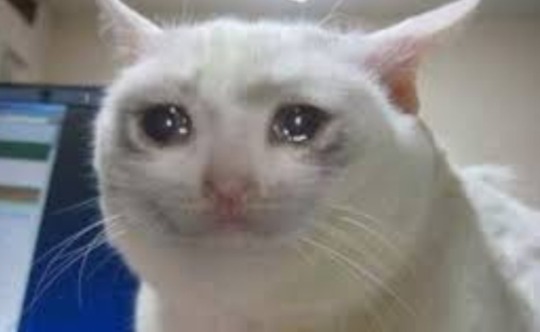
#I AM FINE . SO TOTALLY FINE AND OKAY#if you thought i was done with the sw quote posts . think again#the gambit series was karen miller taking up a steel chair and pummelling me with it#it is just a non-stop emotional roller-coaster of 'hey what if we reminded you that at his heart anakin was a passionate and caring person?'#'what if we just constantly bombarded you with the fact anakin empathises with the suffering of others because he knows and lived suffering'#'what if we reminded you that he never moved on from the trauma inflicted by the cruelty of a childhood spent in slavery!!'#and that is on top of him and obi wan being so two halves of a whole the entire time that it's almost overwhelming#anyway . normal again#star wars#sw tcw#star wars the clone wars#clone wars gambit#anakin skywalker
189 notes
·
View notes
Note

I just saw this meme. I disagree with the sentiment because a), “border dispute” can mean full-on war, and b), Padmé’s a Senator and probably has more power to send Jedi places and she’s just pulling a Knight away from other duties to play bodyguard.
What do you think?
I think it's the stupidest meme I've ever seen given that we never ONCE see Padme do a single thing about slavery herself, Padme didn't even realize that slavery was still a PROBLEM not that long ago, and TCW explicitly has an entire arc that shows not just the Jedi dealing with slavery but the slavers hating the Jedi specifically because the Jedi dealt with them already a while back (the only reason they're still doing shit is because Dooku/the Sith and the Separatists are putting them back in power, but they're still clearly much diminished from what they used to be).
It's also massively minimizing "the slavery problem" to something that can be easily and simply solved rather than a humongous proposition that takes a lot of time and effort to handle.
So whoever made this meme can just fuck off.
(I will say that Padme herself is NOT pulling away Obi-Wan and/or Anakin to be her bodyguard, she specifically doesn't WANT a bodyguard but Palpatine and the Jedi both insist on it for her own safety.)
197 notes
·
View notes
Text
Something I love about Star Wars is how Luke didn't fix Anakin, he gave him the courage to save himself.
Anakin Skywalker is both a villain (and an abuser. I mean he tortured his own daughter and cut off his son's hand, come on) and a victim, that much is obvious. He is, most importantly, a slave. There has never been a single moment of his life where he wasn't/hasn't felt like he was a slave to something. Watto, the Republic, Palpatine, maybe even himself — you name it. He has never been free.
When Luke goes to the second Death Star, he is going to his father, to the suffering Palpatine is putting Anakin through (he is the main victim of Sidious's abuse and torture, something many people tend to forget). To the suffering Anakin is making himself go through, because, while it was heavily influenced by Palpatine, Anakin's choice to never leave was his own.
He Fell, and that wasn't his fault, but he chose to stay there. Many people — namely Padmé — gave him second chances. Padmé gave Anakin the chance to leave and stay together, but he didn't take it. He did all of it to save her, and it the end, he ends up believing he was the one who killed her (he 'destroys' his goal, because that's what the Dark Side does. You may begin as a noble person looking to save someone, but the Dark Side isn't good, and you will lose track of yourself along the way.)
And now here he is, inside a prison that is seen as his own suit. A prison he was put in, a prison he chose to stay in. By the time of ROTJ, he truly believes that it's over for him. That nothing can save him. That there's no hope. Anakin, the lifelong slave, is resigned to his fate. “It is too late for me, son,” he tells Luke, who willingly came to him wearing shackles.
And Luke, still believing that there is some humanity in Darth Vader's armor, doesn't deter. He doesn't let his father's words stop him. He shows that he's willing to give himself away, to die, just to save him.
Luke Skywalker, son of Padmé and Anakin and the last Jedi Master left, shows a man turned monster that he loves him unconditionally. He shows him that no, it's not too late for him, not now and not ever. And this — his selflessness, his compassion — is what finally gets through Anakin. Someone loves him, and he loves them back. And he would do anything to keep them alive, including killing his own Master and breaking his chains.
It's Luke's own sacrifice that inspires Anakin to give up his life. It's Luke's undying hope that motivates Anakin to finally break his own chains. It's Luke's trust in him that gives Anakin the courage to save himself, and in that single act, he saves the entire galaxy.
The light comes to him in the form of one Luke Skywalker, extending his hand for the last time — the light comes to him when he takes it.
The Prophecy is fulfilled when Anakin kills Palpatine and leaves the dark. The galaxy is saved when a father dies for his son.
#star wars#original trilogy#sw ot#anakin skywalker#darth vader#luke skywalker#emperor palpatine#chancellor palpatine#darth sidious#sw meta#star wars meta#i think that's what it's called?? idk#tw slavery#just in case :)#avis' post#anakin is freed in death and i will forever be sad about it#luke deserved to grow up with his parents :(( anakin you took everything from us#w ur stupid ass choices and bad decisions
101 notes
·
View notes
Text
Real talk rant:
I swear to god if I hear ONE more fucking post along any of the lines of “slavery for Anakin wasn’t really that bad” I’m going to lose my FUCKING mind. NEVER EVER under ANY circumstances is human trafficking “not that bad”. EVER. I WILL NOT MESS WITH YALL. One more fucking person has the balls to claim that to me and I will roast the ever loving shit out of them on public main. Fuck anyone who has the audacity to say stupid shit like that.
#serious as all fuck#this isn’t a joke#anakin skywalker#star wars#anakin star wars#anakin#anakin needs therapy#fuck slavery#slavery on tatooine
198 notes
·
View notes
Note
hey remember when we were discussing how weird the whole cliegg thing is in AOTC. and you had thoughts, feelings and emotions. tell me about those XOXO
(Big TW for this post - I discuss human trafficking, sex trafficking, rape, child abuse, slavery, and PTSD in this post. It's about the realities of slavery and Tatooine and how it involves the Skywalkers.)
Something that I almost never see in any discussion on the Lars family is how sharply the fanon headcanons and characterizations of diverge from the ones we get in the moves. Like, particularly Cliegg and the prequel trilogy. Like - I feel like there's this automatic assumption that the Lars loved Shmi and that they cared for Luke out of dedication to her and her family, and it's this huge found family vibe but like can I be real. Can I be super real right now. It’s something that I find kind of baffling, because when I watched Attack of the Clones, and on every rewatch since (and there have been many), it always seems kind of obvious to me that Cliegg bought Shmi as a slave, presumably as a house slave, if not outright as a part of sex trafficking. And I don't mean in one of those "He bought her to free her, he's a good guy, etc etc". I mean, he bought her as a slave with the original intention of keeping her as a slave. And what's really interesting, is you can get pretty much all the clues about that from the exchanges between Anakin has with Watto, his and Shmi's former master.
Again, I want to stress that, because I think it's crucial that we see this for what it is - not an exchange between a former employee and his boss, not an exchange between a kid and a member of his former community. His former slavemaster. The man who won him and his mother in a gambling game like so many fancy necklaces. The source and object of Anakin's childhood enslavement. Watto would have beaten them. He made Anakin, a child of 9 - and I read somewhere once that Anakin started in the races at 6 - ride in a pod race that no human has ever won before, with the full expectation that he would die. This is a being whose entire life has revolved around the certainty that society is not only capable of functioning, but functions best, when sentient beings can be bought and sold like property. And, to be real with you, because this is a thing that happens to people who suffer enslavement, he very likely loaned them out temporarily for sex trafficking purposes for a quick buck - a practice that is noted historically in virtually every society that operated on a system involving slaves.
It's important to recap that, because I do think it's impossible to understand how deeply horrifying the conversation they have is without that context. Like, let's look at how he tells Anakin about Shmi -
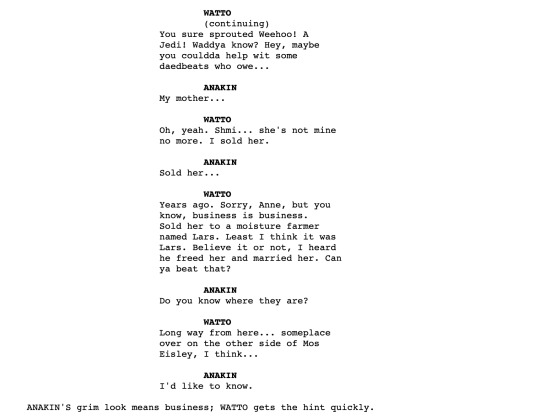
This scene is....so telling to me.
From the outset, Watto said he sold her as a slave. Like, it was a slave exchange. Watto heard about her freedom later - clearly, Cliegg bought her, and behaved in a way - intentional or not - that Watto believed he was buying her as a slave to own as a slave. That part is not subtext, that's just actual text.
"But Mikhayla" some will say "he freed her the second he bought her - he bought her in order to free her."
Except....there is genuinely nothing in the movies, and off the top of my head, the wider narrative, that ever indicates that that's true. In fact it makes no sense in that case, for Watto to have not known that Cliegg was buying her in order to free her. Why would he have to hide that? Watto presumably doesnt care what happens to her, because he's selling her. In the larger materials, its said that his shop fell on hard times, and in the movies, we can see the proof. The script says he's sitting outside his shop, but at that point it resembles more of a kind of beaten down stand. He's still selling junk, but less and of poorer quality - presumably, he's spent all his money on gambling debts. And the thing is, slaves are expensive. He sold her years prior, and I bet he fed himself on that money for a very long time - he was a very motivated seller, as barbaric as that language is to use about a transaction involving a human person. He's not going to be fussy over why the person buying her wants to buy her.
There's also the fact that this is a society that vastly runs on slavery, and large plantation owners would often "rent" out slaves to smaller but still profitable farms. And Cliegg is a moisture farmer with presumably a large tract of land for water vaporizers. If anything, I can see Watto having rented Shmi to her, Cliegg taking a liking to her, and then approaching Watto to buy her. I mean, if he's profitable enough to just buy a slave, then he clearly had at least some money.
"He spent his whole savings!" Show me that in the text.
"He loved her from the start!" Show me that in the text.
"But Mikhayla," yet others will say, "he did free her! And then married her! He clearly meant from the start to free her, and only bought her to get her away from Watto. He could have never seen her as property. Who would marry their slave?"
Except, in the real world, this is...another thing we see across multiple historical records, masters buying women as slaves and then later freeing them in order to legally marry them. PARTICULARLY in societies that operate so heavily on an entire caste system involving slaves - we can look to the Roman Empire, for example. Countless Roman officials, merchants, and military officials bought women, fell in love with them, and freed them in order to marry them.
"But maybe she said yes!" (I know these are not your objections, but as you know, I'm an attorney, which means I constantly have to find an argument to fight against). So, to this imaginary detractor I say: I feel like it should be rather obvious, but I'll say it just in case - it is impossible for a slave to consent to any action they perform at the request of a slave master. It cannot happen. A woman who is enslaved cannot consent to marrying the man who bought her, and who has very likely been raping her up until this point, and wants to now marry her - usually, to make any children he had by her legally his children, and therefore citizens, rather than slaves themselves.
So really, whether or not Cliegg had a change of heart doesn't actually change my mind about his actions towards Shmi. I don't care if Cliegg DID love her - in fact, I'm sure he DID love her. People can and have convinced themselves of all kinds of moral superiority, people can claim to love someone while owning them as property! Shmi could never consent to marrying a man who held her as a slave. Even if he freed her, and she willing chose to stay there for a few years, and then he asked her to marry him. In my head, you can't overcome that power imbalance. Cliegg will never not be a man who once believed Shmi was a thing to be owned. He will never be a man who didn't see her as property.
Like, at some point, it actually becomes kind of more and more unlikely that this is a guy who took up this transaction for non-malicious purposes. Because we simply do not see it in the movie. What I see in the movie is a slave owner saying he fell on hard times and sold his slave to a farmer who probably needed help on his land or in his house - he has no wife, so the latter is probably more likely. I see him saying that at the time of the transaction, he had no idea that Cliegg intended to free her. And for all that Cliegg calls Shmi his darling, his love, his wife - not once do we ever hear of any evidence that Shmi saw this as a love match. In fact, the only thing we find out about her daily life with the Lars family is that in the mornings, she wakes up early and goes to pick mushrooms. You know. A task for the house. An unpleasant task, done before everyone else is awake, that she does absolutely alone. I'm just saying. These implications are not good ones.
I will say though, for all this, do you know what really sells me on the idea that the relationship between Shmi and Cliegg is is not a consensual one, is Anakin's reaction to it. This is a boy whose entire hopes and dreams have revolved around his mother's freedom. You have more excellent writing than me on this, but the moral injury Anakin suffers leaving his mother behind is. Intense. All he wants is to one day free her. In a way, a part of him is always that tiny boy who couldn't bear the idea of leaving behind his mom, who swore, the last time he saw her, that he would free her. And at this moment, all of his dreams have seemingly come true! His mother is free. According to Watto, she's found love, and married. For all he knows, she's had other children. Maybe that could involve SOME complicated emotions, but mostly you would expect that he would feel, at the very least, relieved. Happy. Interested, curious.
Instead, this is his reaction:

He's grim, business like. He is not happy. He is not relieved. He doesn't even seem to acknowledge that she's still alive - the way he reacts is not a man who thinks his mother is out of danger. To Anakin, who grew up enslaved until 9 and knows how this society works, it seems almost immediately apparent that the Lars are just a different kind of danger.
There's also this rather interesting detail:

This is a boy who bleeds, every second of every day, longing for a family. He basically begs at obi-wan's feet day and night, to be acknowledged as a son. His reaction to his wife's pregnancy is radiant joy - his reaction to know she could die, profound existential horror. I mean good god, he basically turns Palpatine aka Satan Himself into a father figure, because he's that desperate for one.
And here, this man is claiming him as his family. He's talked about being excited to see him. He talks about planning with Shmi to meet him. He calls him "son".
And Anakin doesn't give him another moment of his time, the second those words are out of his mouth. It's silence. For a boy who is so starved for intimacy he genuinely falls in love with the very first girl who was ever nice to him, to react to a claim of relationship this way. It's bizarrely out of character for him. Unless it isn't. UNLESS he's disgusted by that claim, instead of relieved by it. If he thinks his mother has been bought and then forced into marriage, of course he hates Cliegg. I remember when we were watching the movie together, and remember I said to you "You can just tell Anakin is thinking, 'Call me son one more fucking time'"
And can I be real, I have so much more to say about this. As you know, I actually have essays of opinions and feelings about Shmi Skywalker and her horrible life, and how Anakin was the one bright point she had in that horrible life. I have feelings about how she gave away her only happiness, because she knew he did not deserve the life of a slave. I had ideas about how you could turn this into a way to actually fix AOTC and make it better, a way you could use it as an excuse to get rid of the Tusken arc entirely without losing the tragedy of his mother's death. But this post is already so fucking long and I'm sure you're tired of me talking xoxoxoxoxoxoxoxoxo
#star wars#human trafficking tw#abuse tw#csa tw#rape tw#slavery tw#all the trigger warnings#GOD THIS MADE ME REALIZE HOW MUCH I FUCKING LOVE SHMI SKYWALKER#BECAUSE SHE HAD JUST#THE SHITTIEST LIFE RIGHT#LIKE SHES BORN INTO SLAVERY AND SHE DIES IN SLAVERY SHE LOSES EVERYTHING HER SON IS GONE SHES MARRIED TO HER SLAVE MASTER SHE DIES IN PAIN#BUT HER LOVE FOR ANAKIN WAS SO GOOD#SO INTENSELY AFFECTIONATE AND VALIDATING#EVEN IN ALL THAT HELL#THAT WHEN ITS RIPPED AWAY FROM HIM FOR GOOD ANAKIN BASICALLY LOSES HIMSELF ENTIRELY
356 notes
·
View notes
Text
Lost in the Moonlight 🩸🦇
Anakin shrieked as he fell to the dirt, sharp pulses of pain throbbing up his legs. Whatever he just stepped on cut right through his foot, but it didn’t matter. It couldn’t.
With a pained groan, he forced himself off the ground and hobbled to his feet. His face was slower now, but no less purposeful as he left bits of blood on the grass with every step. The few bits of chain that remained attached to his iron braces swung wildly, smacking Anakin with every pump of his arms.
All he could see in front of him were the hazy outlines of trees. He was hoping the dark would cover for him, but he had no way of knowing such a thick dog had settled in. His shoulders and cheeks stung from brittle branches scratching at him like a wild cat.
The voices behind him grew louder. He could hear the echo of horse hooves as they tore up the forest floor. His fate, one worse than death, catching up to him with every second.
No. Please.
Suddenly, the forest parted like the tales of the Dead Sea. Anakin was charging sluggishly through a mighty clearing where a large manor house sat in its center. The moonlight shone off its edges. The iron bars of the balconies and the shingles of the roof. The orange hue of candle light was no where to be found. It didn’t matter. Anakin had to keep going lest they catch him. Drag him back to be broken. To be kept and owned and mistreated over and over again.
His injured foot slammed into a rock, and Anakin hit the ground. The rushing pain, the exhaustion, the malnourishment, it all seemed to overcome the young man as he lay in the yard.
I hope they kill me. Anakin thinks. Better dead than to live a minute more as a slave.
A pair of legs step into his view. That doesn’t make sense, though, since he can hear the angry yelling of the house enforcers and slave keepers still approaching.
“It’s still practiced?” A posh voice calls from above him. “Even after all this time? Perhaps the world is progressing slower than I thought.”
The legs crouch, a cool palm cups his cheek, and then he is staring into the vibrant red eyes of the prettiest man he has ever seen.
No, not a man. Not quite.
“Don’t worry, dear one.” He coos, thumb making comforting swipes back and forth across his cheek. “Everything will be alright.”
The man moves, stepping around him, and Anakin succumbs to his exhaustion to the sounds of death.
#obikin#obikin au#Obikin snippet#writing snippet#star wars alternate universe#alternate universe#vampire au#vampire#slave Anakin#slavery#death#writing#one shot
56 notes
·
View notes
Text

[Star Wars: Episode I - Qui-Gon Jinn]
70 notes
·
View notes
Text
The only way Anakin's reaction to Slick's betrayal makes sense is in the context of "How could you do this to your brothers? You know now that you've failed that they're going to be subject to even more scrutiny, even more prejudice and abuse, because of you. You say you love your brothers, but you did this with zero plans to protect them from the fallout of your actions if you failed. I, of all people, understand your desperation, but there are incorrect ways to escape slavery, and all of them, like yours, wind up hurting the other slaves your master owns. Slavery is a community, not a vacuum. How could you do this to your brothers?"
But something tells me that's very likely not at all what the creators were thinking.
#/incoherent noises/#star wars the clone wars#anakin skywalker#tcw slick#tw slavery#slavery tw#slavery#star wars slavery#slavery in star wars
26 notes
·
View notes
Text
Pro-Jedi Essay On the Life and Fate of Shmi Skywalker (long post)
Many who believe that the Jedi Order had lost their way, are pointing at the life and death of Shmi Skywalker. However, their arguments are based on unexamined assumptions regarding the role and ways how the Jedi Order operates, the political and legal reality of the Galactic Republic, or founded on morals different from those depicted and advocated by George Lucas.
This is a long essay, possibly the longest I ever wrote, since each and any discussion regarding Shmi Skywalker and the Jedi Order, is the interplay of five distinct topics, con-joined and informing each other. These are:
The Paradigms of Love: Hierarchical vs. Horizontal
The Fall of the Galactic Republic: Fallen Symbiosis
Horizontal love, Anakin Skywalker and the Jedi Way
The Dark Side of "they could've free at least Shmi!
The Life and Fate of Shmi Skywalker - the Problem with "Deserving"
The Paradigms of Love: Hierarchical vs. Horizontal
One of the core lessons throughout George Lucas Star Wars, is that we need to clear ourselves from the attitude of discrimination toward others, based on feelings of distance and closeness, and that love manifests in two ways, along the same lines. On the one hand, there is love for those who’re immediately around you – your spouse, your parents, your children, your friends, and you do everything you can to protect the people that you love, against all those others outside that very tightly drawn circle. It’s driven by attachment: whether a person is within or without that circle, is determined by whether or not you find them enjoyable, agreeable, pleasant and satisfying, or whether or not they share your beliefs and opinions. We have the idea, deeply embedded into our minds, that the willingness to put people within that circle, our “personal relationships” first, and all the others who we have a bad, or no relationship whatsoever, second, is the measure of love, loyalty, commitment, affection and care.

On the other hand, there is unconditional love, that is compassion: wanting another person to be happy and free from suffering. By definition, compassion means to feel with, to suffer with and to experience with another - it's the sense of profound oneness, innate connectedness, a sense of being parts of each other, when we feel another person's suffering or happiness as our own. Just like when we hurt our finger, we don't think, "Oh, my finger is hurt, maybe I should help it", but rather, there is an instant and intuitive, natural response to it, our quest to be happy and not to suffer is inseparable from and complemented by the same quest of our loved ones. Unlike attachment, compassion can extend beyond the individuals who we're close with or make us feel good; based on the realization that all living things want to be happy and doesn't want to suffer, just as intensely as we and our loved ones are, it can encompass all living beings wanting to be happy and free from suffering - in fact, not even one living thing can be excluded from the circle of compassion. And therefore, if compassion is genuine, it's no longer possible to make hierarchy between the well-being of the people who're close to us and of those with whom we have adverse or no relationship at all.
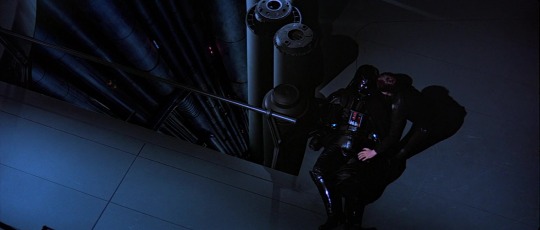
It's essential to understand that genuine compassion is to abandon such hierarchical thinking, not the reversal of the hierarchy, that is to discriminate toward the people we have close, compassionate, loving and trusting and personal relationships for the sake of the people we have adverse or no relationship at all. Nor does genuine compassion allow for lowering the love, care and commitment we have for those close to us, or to forego such relationships, that is trying to avoid discriminating based on feelings of distance and closeness, by not getting close to anyone. In many ways, that's more unwholesome. Genuine compassion is horizontal: the realization that all living things want to be happy and doesn't want to suffer, just as intensely as we and our loved ones are, allows compassion, the wish for others to be happy and not to suffer, to spread effortlessly, evenly, inexhaustibly. Indifference is to say, "I care no more for my mother than I care for a stranger", compassion is to say, "I care for this stranger no less than I care for my mother." In Buddhism, indifference is the "near enemy" of non-attachment: it's mimicking it, but it pushes us into suffering.
The Fall of the Galactic Republic: Fallen Symbiosis
The Balance of the Force
George Lucas' Star Wars story is essentially about the loss and restoration of the balance of the Force. Although there are many interpretations on this concept, Lucas himself was very clear on that balance of the Force means keeping our selfishness under the check of our selflessness and avoid falling to the dark side, which is greed and self-centeredness, and being compassionate instead, which is loving each other unconditionally and caring for each other. It's dual: when you find balance, you're a compassionate individual, you control your selfish side, and you can do a lot of good things; and when you have a group made up of compassionate individuals who control their greed, you can have a symbiotic circle, which is the balance of the two sides of the Force at large, of the galaxy itself, that is selfishness being under the control of selflessness, and people come together to be as one, cooperating.
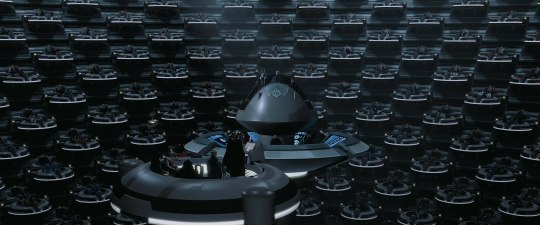
The central conflict of George Lucas’ Star Wars story is the loss of balance and the fall of a symbiotic relationship. The Galactic Republic is the galaxy forming a symbiosis, following the horizontal paradigm, existing in balance; the loss of balance is the shift from the horizontal love paradigm to the hierarchical one. "The Republic is not what it once was. The senate is full of greedy, squabbling delegates. There is no interest in the common good" and it "no longer functions" as it was said it Episode I, and as Lucas tells us, it's because "the Senators have fallen out of the symbiotic circle” and “they couldn’t agree on anything because their interests became so divergent, so they couldn’t get anything done as a Republic.” It's crucial to understand that although it's very popular to declare that the problem was the Senate, therefore, the Jedi Order was supposed to stop serving it, the issue depicted in Lucas' Star Wars is far worse and roots deeper than that. As corrupt and dysfunctional the Senate become, it was made up of senators who were elected directly or indirectly by the people of the member worlds. And as Ahsoka teaches the youth of Mandalore in Clone Wars, "citizens must be vigilant so corruption can't take root" and "it's every citizen's duty to challenge their leaders, to keep them honest and hold them accountable if they're not. Lasting change can only come from within." The horizontal love paradigm was declining in the entire galaxy, with individuals no longer operating as a group, no longer running their democracies, slowly drifting towards the hierarchical paradigm, which eventually erupted in the Separatist movement and the Clone Wars, resulting in the galaxy's fall to the dark side: the Galactic Empire. As Lucas summarizes the fate of the Republic: "well, the people gave it away." One of the core reasons why the "Jedi lost their way" theory gained a foothold is because the people are very much troubled by this notion, since it reveals that they have all the responsibility for maintaining democracies.
Understanding the Hutts and Hutt Space

The existence of slavery at the Outer Rim is the result of the gradual decline of the Galactic Republic. Tatooine is an out of the way, small, poor, sparsely populated planet on the outer rim of the galaxy, the home of the Jawas, the Sand People, scavengers and moisture farmers, controlled by the Hutt families who are vile galactic gangsters. It's part of the galactic underworld, where the anti-slavery laws of Republic, that are, as Padmé says, outlawing slavery in the entire galaxy, are not respected. As Shmi states, "The Republic doesn't exist out here. We must survive on our own." On Tatooine, the Republic's currency has no value, as people want "something more real", like ships, pods or slaves or "wupiupi" which is most likely made of something that has value on its own. Being the den of a powerful crime lord, the planet's spaceports, where slavery thrives, are "havens for those that don't wish to be found" and a "wretched hive of scum and villainy" - it's no surprise that in the cities grown around them, holding others hostage for economic gains or pleasure, which is against the laws established by the Galactic Republic as well, is part of everyday life. Hutt-controlled Tatooine is not a "slave state" as opposed to the "free states" of the Galactic Republic, like in the pre-1865 USA, nor it's an entity that shares borders with the Republic. In truth, Hutt Space, and everything within its borders can be paralleled only to those areas of Sudan, Liberia, Sierra Leone, Uganda, Congo, Niger and Mauritania, where the government has no effective control, and slavery is still alive and well in 2023. Although Jabba and the others are usually addressed respectfully, they're universally regarded as "criminals" or "vile gangsters." When Palpatine says, they must reach an agreement with Jabba, Mace Windu replies: "I don't like this, dealing with that criminal scum. This is a dark day for the Republic."
The Jedi Order: Guardians of the Waining Light
The Jedi Order was well aware of that the Force is out of balance. As Lucas says, "[Dooku] carries the sympathies of most of the Jedi, which is that the senate is corrupt and it's incapable of carrying on any meaningful action, because they argue about everything all the time" however, restoring lost balance cannot be done through force, only through bringing compassion and sanity back to the Senate and the galaxy. Many who believe, the Jedi Order had lost its way, argue, the Jedi Knights failed as guardians of peace and justice, neglected their duties and turned their backs on the most vulnerable - however, such allegations are founded on the idea that they were supposed to be the ones in the universe who erase injustice, conflict, and wrongdoing. It's very important to remember that the Jedi Knights, as they state it repeatedly throughout the Saga, are "keepers of peace, not soldiers" and "not warriors." Even though the Jedi Knights were inarguably very good warriors, in Episode II, it was illustrated powerfully that they cannot win on the battlefield. "A lot of people say, 'What good is a lightsaber against a tank?' The Jedi weren’t meant to fight wars. That’s the big issue in the prequels" Lucas reminds us. "If they do have to use violence, they will, but they are diplomats at the highest level" and "they don't kill people. They don't fight," and they "weren't mean to fight wars." If they Jedi would've decide to wage a war on the Hutts, the war would've siphon off Jedi Knights, neglecting the rest of the galaxy and they’d have lost, most of them killed, making things even worse.
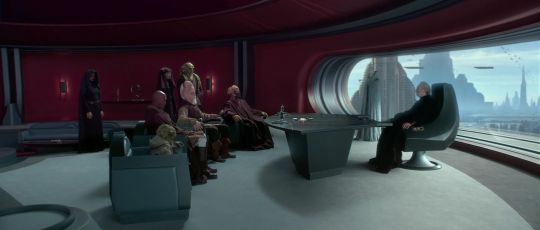
The essential difference between a Jedi Knight and a superhero is that superheroes are fundamentally god-like individuals who fight our battles for us: they topple dictators, stop corrupt politicians and greedy companies, they fend off armies, stop us from destroying ourselves. A Jedi Knight cannot and won't do that. As George Lucas says, "[the Jedi Knights] were never designed to be a superhero or anything like that. They were designed to be a Buddhist monk, who happened to be a very good warrior." Whenever they're do involved in battles, they do so in order to protect key figures who're able to unite their people against the forces of greed and destruction, like Padmé Amidala, both Queen and Senator, and Duchess Satine. They worked closely with the Chancellor of the Republic, especially with Palpatine, who promised to fight off corruption in the Senate and lead the galaxy toward a better future. They are “monk-warriors” who are “monks first, and they try to convince people to get along.” They’re “ultimate father figures” and “intergalactic therapists” and “warrior-monks who keep peace in the universe without resorting to violence.” They are heavily reliant on compassionate, democratic, thus strong galactic community, the ever-growing symbiotic circle, to guard peace and justice: the Jedi Order needed the Republic, and later, the Rebellion, to succeed. And they had reassurance that the lost balance will be restored: it was prophesied that the Chosen One will come and bring balance to the Force.
Horizontal Love, Anakin Skywalker and the Jedi Way
Widely popularized ideas are that the reason why Anakin is not going back to Tatooine to free Shmi, is because he was forbidden by the Jedi Council to do so; he expected something fundamentally different regarding the Jedi teachings, or their way of life, their limitations or the way how they operate - however, these ideas are not just lacking any rational basis in the actual story, but also wildly contradictory to Anakin's portrayal. In truth, all these assumptions are stemming from fans conflating their own expectations and perceptions regarding the Jedi Order with how Anakin and other characters are actually viewing them, and/or the desire to see the hierarchical love paradigm being affirmed by Star Wars.
"I had a dream I was a Jedi. I came back here and freed all the slaves"
In Episode I, Anakin Skywalker is a very compassionate, very selfless and very good kid, who gives without a thought of reward and know nothing of greed, who dreams of becoming a Jedi Knight, and he is very clearly thinking along the lines of the horizontal model of love. He tells Qui-Gon, "I had a dream I was a Jedi. I came back here and freed all the slaves. Have you come to free us?" which clearly shows that he considers himself as part of a team, encompassing all the slaves in Tatooine, and in his mind, a Jedi Knight is not only freeing his mother and friends, the people he's close with, but everyone. When he is about to leave with Qui-Gon to actually become a Jedi Knight, he vows, “I will come back and free you, mom” and we know that he plans to achieve this by making his dream come true.
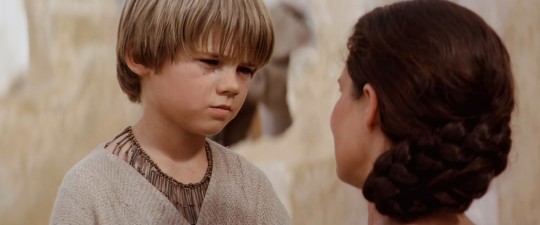
Anakin's situation is the same as Padmé's in Episode I: while Naboo is invaded and its people are tortured, Padmé does not establish a hierarchy between the well-being of her loved ones and the well-being of the rest of the Naboo, but decides to go with Qui-Gon to Coruscant to ask the help of the Senate, which was supposed to be the quickest, easiest and most effective way of freeing her planet. Anakin leaves with Qui-Gon for the Jedi Temple at the heart of the Republic, to become a Jedi Knight, to become the hero who will return and bring freedom to his mother and all of the slaves.
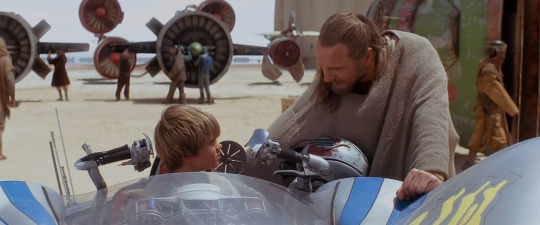
It's to be noted that even though a portion of the Star Wars fandom criticizes the Jedi Knights for not ending slavery on Tatooine or not trying to free at least Shmi, accusing them with indifference or failure to do their duty to guard peace of justice, Anakin Skywalker himself doesn't hold these opinions. He knows that a Jedi Knight brings peace and justice, and his expectations that as one of them, he will free his mother and all the slaves, is realistic: the anti-slavery laws of the Republic are outlawing slavery in the entire galaxy, and in the past, with a functioning Republic, the Jedi Order dismantled the slave empire of Zygerria, enforcing the laws, guarding peace and justice. It's very important to notice, that even though he believes, "no one can kill a Jedi", it never once occurs to him to cast stones on Qui-Gon or the Jedi Order for the conditions on Tatooine - he's offering his help so they can leave the planet and continue their journey to Coruscant as soon as possible. Never once suggests that they should go to battle against the slavers, or use violence against them, not even when he realizes that Shmi must stay on Tatooine. All this clearly shows, he understands and adheres to the Jedi way. Even more so, the only thing that Anakin is shown to be wrong about the Jedi Knights was his belief, "no one can kill a Jedi" - never once he gives any reason for us to believe that he expected something fundamentally different regarding the Jedi teachings, or their way of life, their limitations or the way how they operate. It should be noted that it's not the Jedi Order, but the Republic, what he becomes more and more frustrated with: in Episode II, he admits, "I don't think the system works," believing, if the people can't agree on what's the best for the most people, "Well, then they should be made to."
Anakin's Decision and the Circumstances on Tatooine
Part of the problem is that slavery is a very emotionally charged issue to discuss and for some, this may result in a quite misguided assumption: the fact, Anakin and Shmi were enslaved, means, the mistreatment of the slaves of ancient times, the torture and brutal dehumanization of enslaved black people in the southern U.S. as well as the suffering of victims of modern day slavery, are all integral part of their lives on Tatooine. Oftentimes, it's founded on the belief that their enslavement indicates, signifies, represents slavery in general, thus, it must be viewed, imagined, discussed through the historical, cultural, political and social parameters in which the Atlantic slave trade, how it relates to the U.S. and the West as a whole, is central. However, such approach is highly problematic: the type of slavery they were subjected to, lacked, and therefore wasn't the offshoot of the dehumanizing brutality of racism. In George Lucas' Star Wars story, slaveholders were shown to recognize differences between species, but they collapsed those differences to the consideration: “the weak deserve nothing more than to kneel before the strong, bound to our service.” This type of slavery obviously can, and often will result in brutal, inhuman treatment, but it's crucially important to acknowledge that just like Ancient Greek, Roman and Egyptian slavery was very different from the type of slavery in the southern U.S., slavery in Star Wars also has different political, cultural and social aspects and it must be examined and discussed accordingly.
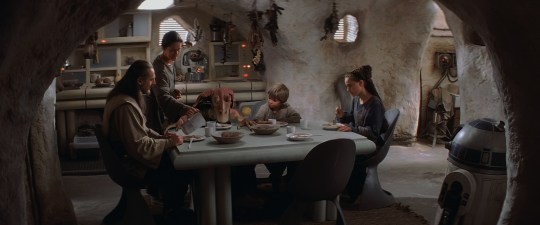
In Episode I, the Skywalkers were shown to lead a life similar to a serf - they lived independently from their slaver, owned personal property and money, were able to negotiate transactions, had considerable freedom in their daily lives. Anakin was shown to feel safe to talk back to Watto, to declare, he won't let himself being defined by his status as a slave, to speak his mind and to confront Sebulba, or to discuss his plan to locate his transmitter and escape, with strangers, and it was shown that a slave is expensive enough that the prospect of having to pay for it, stopped someone as aggressive and hateful as Sebulba from harming Anakin. Although Watto didn't seem to be bothered by promising Anakin to Qui-Gon, which could indicate that it was accepted to split families, it's worth to consider that Watto believed his win to be a fact, thus Anakin will remain his slave, and that he knew that Qui-Gon is from somewhere where the Republic enforces its laws, which explains, why he's not surprised at all when Qui-Gon says, since he won the bet, Watto must release Anakin, rather than transferring ownership.
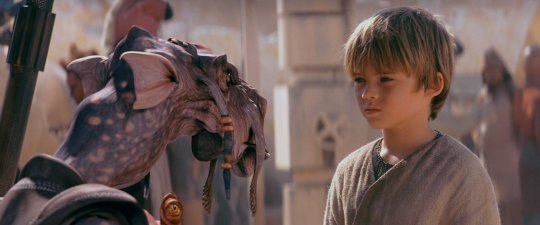
It would be important to note that when he left Tatooine, the cause of Anakin's distress was that he will be on his own and without his mum, missing her, and he become afraid of losing his mother; one must realize that's different from and not the same as being afraid for her life and being worried for her wellbeing. In Episode II, he states, he doesn't understand, why he would have nightmares about her, and when he realizes that he's having premonitions, and returns to Tatooine, his behavior toward Watto is quite friendly, rather than jumping to the conclusion that it must be his former slaver, who harmed Shmi. In fact, George Lucas indicated, Anakin and Watto's reunion in Episode II is analogous to visiting old high school teachers as young adults. What this tells us is that the slaves of those who could very easily afford new ones - such as Zygerrian nobility and Jabba the Hutt - lived a particularly brutal existence, however, most of the enslaved were able to lead a hard, but relatively normal and relatively safe life. Thus, even though Shmi wasn't left in the best circumstances, those circumstances allowed Anakin to leave with the certainty that he will be able to save her.
The Dark Side of "they could've free at least Shmi!"
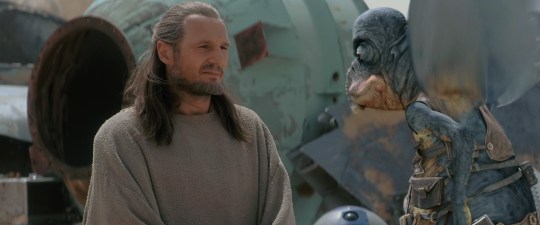
Those people who attach special importance and urgency to Shmi's freedom and insist, Qui-Gon and the Jedi Order was obligated to at least free her, are do so because they like her and they believe she deserves it, or for some, it's Anakin whom they like and therefore they don't want him to be sad without his mum. It's generally unsaid and not even conscious, this type of reasoning postulates that you can and actually, you should arrange people's right to be free into a hierarchy, with those who meet with your standards of goodness who you're close to, or who would make someone you like happy, are enjoying priority over those who you think aren't nice or have no relationship with. Helping those slaves, as this logic goes, is less urgent, they can and they should endure slavery for a bit longer, until the most or more deserving ones are freed. It shouldn't be hard to see, how this way of thinking is actually the flip-side of the way of thinking that condones the institution of slavery, nothing more, nothing less. We have a strong tendency to prioritize the wellbeing of the people who are close to us, who make us feel good, to consider the suffering of people who made us feel bad as well-deserved, to be less concerned, indifferent toward those who we have no relationship at all. But, this tendency is a flaw and it would be important to notice, this is not what Anakin and Shmi would want.
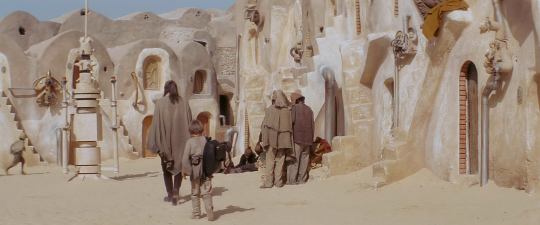
George Lucas’ Star Wars story doesn’t tell us that a non-violent method is the only possible response to injustice and wrongdoing, however, it’s important to point out that this doesn’t mean that it’s ever right to intentionally harm another - but in order to achieve greater benefit for a greater number of people, or when there is no other way to save the defenseless against the aggressor, or it’s an either you or them situation, you can certainly use a violent method. If we examine the situation, killing Watto doesn’t meet with these requirements - it has to do more with the desire to inflict harm upon him or the urge to hit out of those who’re outside of the circle of our personal relationships. Threatening Watto with a lightsaber wouldn’t be as harsh as killing him, but there is no way of preventing him from crying for help - unless killing him - and that would lead to even more killing, not to mention that chances to leave the spaceport would shrink greatly. Therefore, these aren't wholesome responses, and it should be clear why Shmi and Anakin, although he believes, "no one can kill a Jedi," never once suggests that Qui-Gon should go to battle against the slavers, or use violence against them, not even when he realizes that Shmi must stay on Tatooine as Watto's slave, he does not cast stones on him or the Jedi Order for not going to Tatooine to save her. He clearly adheres to these principles in Episode II when he sneaks into the Tusken camp, rather than massacring his way to his mother, but when she dies, out of anger and hate, he wipes them out to avenge her, and in the Clone Wars, he slowly, but steadily becomes more and more willing to kill his opponents, even when he has other options.
A note on Qui-Gon Jinn
Sometimes, Qui-Gon Jinn is accused with being indifferent and ungrateful for not freeing Shmi Skywalker, but, once all unexamined assumptions about the Jedi Order are cleared away, once the dark side of the "they could've save at least Shmi!" is acknowledged, we must realize, Qui-Gon takes Anakin to the Jedi Temple, because he realized, he discovered the promised Chosen One - making him a Jedi Knight, a guardian of peace and justice, giving him the proper training and upbringing to fulfill his destiny, would restore balance to the Force: selfishness under the control of selflessness, people are together as one, cooperating, the Republic functioning enforcing its laws and principles, ending slavery, as it did in the past.

When Shmi asks him, whether he is able to help Anakin to escape slavery, Qui-Gon replies, "I don't know. I didn't actually come here to free slaves." It become popular to assert, this somehow must mean that Qui-Gon is not interested in or he is not intending to free slaves, however, simply no compelling rational basis exists for this assertion. Qui-Gon Jinn is not on Tatooine to free slaves, he was forced to land on the planet ruled by a crime lord, in the middle of a mission to escort a queen who must save millions, to the capital, and he is in desperate need of help. The reason slavery exists in the galaxy is because the Republic no longer functions and fails to enforce its anti-slavery laws. Misinterpreting and misrepresenting these facts is grounded on ingrained mistaken assumptions. In addition, there are those in whom the words, "I didn't actually come here to free slaves" are triggering an emotion that, overthrowing reason, demands them to react with "if he is not on Tatooine to free slaves, he doesn't want to tear down the system!" Which, of course, lacks any sane basis.
The Life and Fate of Shmi Skywalker - the Problem with "Deserving"
It was Shmi Skywalker who taught her son, "the biggest problem in this universe is nobody helps each other." She, just like Anakin, gave without the thought of reward and was full of compassion: despite she was a slave on a world made of dust, Shmi had unwavering commitment to, and raised her son in the spirit of the horizontal love paradigm, was willing to offer refuge to strangers in her home and sharing her meal with them, and was willing to let her son go, so he can become a guardian of peace and justice in the entire galaxy.

Shmi Skywalker, just like her son, had no misconceptions about the Jedi Order and the galaxy: she didn't accuse Qui-Gon or the Jedi in general with failing their duties or being indifferent toward them, and even though she was well aware that the failing Republic abandoned her, she took no pleasure in the misery in the misfortune of Padmé and the others, but was willing to help and letting Anakin to help them. After Anakin left Tatooine to begin his Jedi training, Shmi was freed from salvery by Cliegg Lars, a moisture farmer who later married her. One day, when she was out in the morning gathering mushrooms, she was abducted by Tusken raiders, and she was subjected to brutal torture. Anakin returned to Tatooine to save her, but when they reunited, Shmi succumbed to her wounds and died in his arms. She didn’t ask her son to avenge her, she wasn’t bitter, hateful, angry, fearful. She was happy: “Now I’m complete” and she had nothing to say but, “I love you.” In Clone Wars, Anakin, referring to him wiping out the Tusken village out of revenge, claims "I failed as a Jedi, and I failed you" - implying that Shmi, taught him the same morals and ethics as the Jedi Order.
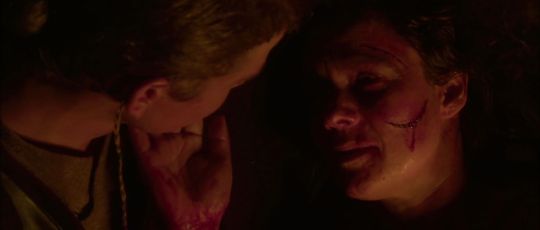
We tend to believe that the world is under the direction of a cosmic moral judge, rewarding good people and punishing bad people - for this, the fate of Shmi Skywalker is often deemed undeserved. From such notions, follows the idea that Qui-Gon Jinn or the Jedi Order was supposed to make sure that justice will be served for her, and what happened to her must be the result of that those, who were supposed to be agents of that cosmic judge, were failed to do their duties. However, the harsh truth is that, the probability of Shmi being abducted by Tusken raiders on Tatooine was the same as the probability of being murdered on any other planet, say, Coruscant. George Lucas' Star Wars presents a cosmos that is devoid of a cosmic system of reward and punishment, and attempts to blame her death on the Jedi Order is quite desperate. The life and death of Shmi Skywalker illustrates the lesson, life will do its own thing, it's not working as a mechanism by which the universe will bring good to good people, bad to bad people. We're interconnected, our lives are interwoven into each other, what happens to us is the product of the actions of others as well as our own, and determined by the degree of balance between selfishness and selflessness without ourselves as well as within others. The greed of Nute Gunray led to the invasion of Naboo and the death of Qui-Gon Jinn, but also led Qui-Gon to Tatooine, where he found Anakin. Shmi let her son go, and her action resulted in the liberation of Naboo, but a decade later, also the formation of the Empire, the destruction of Alderaan, and eventually the death of the Sith and the restoration of balance. Shmi being freed by Lars led to her death in a Tusken camp, Lars marrying Shmi led to his son dying by the hands of imperial storm troopers. All of existence is a vast nexus of causes and conditions, constantly changing, in which everything is interconnected to everything else. Shmi Skywalker illustrates, happiness is not in a reward-punishment system that distributes good and bad among living things based on whether or not they were good or bad. Tapping into her compassion, she was able to accept the reality of the ebb and flow of pleasure and pain of being alive, and was able to find an inexhaustible source of contentment, peace and joy, strength, determination and hope.
Sources:
Star Wars Archives 1999-2005
Star Wars: The Phantom Menace “Prime of the Jedi” featurette
George Lucas’ foreword for Shatterpoint by Matthew Stower
Interviews with George Lucas 1 2 3 4 5
George Lucas' audio commentary for his Saga
Star Wars Saga and Star Wars: The Clone Wars
Please note: I used no Disney or Legends Star Wars materials, (save for the one Shatterpoint foreword) - but I accept that others may found their own reading on them, thus, might come to different conclusions than I do.
#shmi skywalker#anakin and shmi#star wars#very long post#pro jedi order#jedi morals#compassion#attachment#qui gon jinn#slavery#tw slavery
284 notes
·
View notes
Text
Anakin and Slavers
"His undoing is that he loveth too much"
George Lucas
One thing that I always liked about George´s work in relation to Anakin and slavery is how out of the left field he and Dave Filoni wrote Anakin´s relationship to the people who owned or saw him as a property at one point or another and yet it makes total sense for his character.
For example kid Anakin has no doubt that Slavery is horrible and at 9 he is actually working towards developing technology to help free his Mom, friends and himself from it. He hates with capital H the fact those people have control over the life and death of other people but at the same time he has great compassion and kindness which his mother helped nurture. This along with the fact that Watto was the only adult male figure who was around during his early chilldhood, this complicated his feelings towards slavers in a very tragic way.
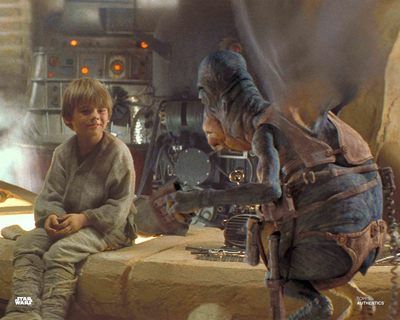
Anakin feared Watto´s violence and didn´t for a moment doubt he would have been willing to sell off his mother or him if the customer got to a big enough price but at the same time he listens to his advice when he travels to the dune sea to do his work with the jawas and his pov is almost as important as his Mom´s, in the novelization of TPM Anakin remembers not to talk to strangers or to get close to Tuskens Raiders camps thanks to Watto´s advice.
So in Anakin´s mind, Watto is someone he fears but also someone he takes advice from, respects to a point, sometimes gets sassy to and actually listens to almost as a father figure BUT at the same time he has no doubt he would activate the killing chip if he tried to escape.
Pain/abuse/fear mixed with care/advice(sounds familiar?) Anakin knows slavery is awful but he can´t help but see Watto as a person because of who Anakin is, Annie is a kind and understanding person and to point may justify Watto as a "Man of bussines" and "Not as bad a other masters" "It could be worse" but he definitely doesn´t trust him in the same way he does his mother, she is blood, she is family. He and Mom are a team.They shared their secrets.
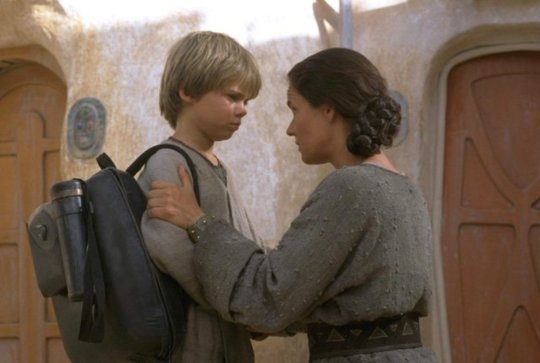
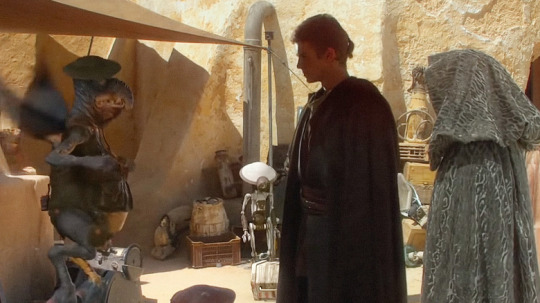
The first time Anakin saw Watto again after being freed, he was a Jedi with training, almost a knight and the first thing he does to the guy who beat him and his Mom some years ago is to ask him if he can help with the ship parts Watto is working on because he noticed Watto is struggling and his bussines is falling down compared to how it was when Anakin was a kid. When Watto noticed who Anakin was he didn´t reject him and accepted his congratulations but keep himself appart, hoping to learn about his mother whereabouts.
When Watto told Anakin he sold Shmi, Anakin doesn´t have a reaction, he takes Watto´s justification of "I am sorry Ani but bussines are bussines and anyway the person who bought her freed her and married her" Anakin doubts it´s as good a picture as Watto is talking about but he takes his justification and leaves.
When he meets Owen, Beru and Cliegg he sees they are indeed nice people and the reason for his mothers suffering is something completely different that they were not able to stop so he doesn´t blame them for her fate. When Anakin lost his mother it was only natural for him to seek a family, someone he could share how he really felt and his secrets, he could not be part of the Lars family but Padme was willing to love him so she became his new confirmed family, right along with Obi-Wan and Ahsoka but while he had to show himself different to them, he didn´t had to do that with Padme, just like he did with his mother.
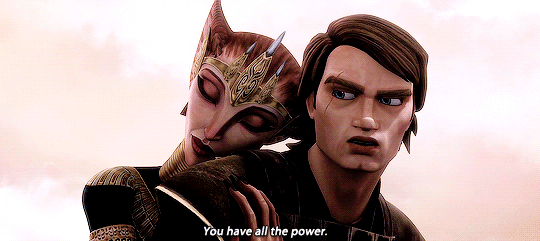
In the clone wars Anakin shows again this complex view of slavers with Queen Miraj Scintel, the cartoon goes out of it´s way to show she looked at him as pretty property and he didn´t let her forget that and actually it was strongly suggested he may have been raped by her at some point to keep safe Obi-Wan, Rex, Ahsoka as well as the people they wanted to save while he got enough soldiers to stage their rescue. Anakin had a plan the whole time just as he did as a kid so he keep his cool even when he saw another slave choose suicide over keep being under the control of Scintel. Yet in the end when the Queen was killed by Count Dooku Anakin felt sorry for her, he could not help it.
So this mix of rejection/anger/hate/disgust towards slavers mixed with pity/understanding which is something that was part of what made Anakin a good person gets used agaisn´t him in his relationship with Palpatine.
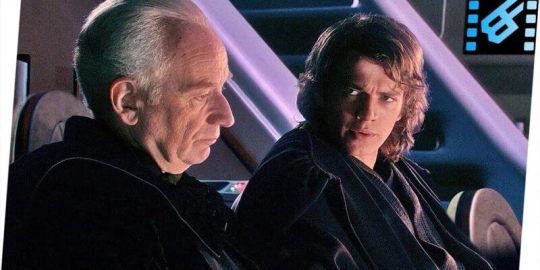
He first shows himself as the father figure Anakin thought he could find in Qui-Gon before he died a better father figure than Watto had been, a father figure that didn´t reject this title like ObiWan did, Palpatine did this to get his trust as a young child and later young adult and then he showed himself as the real sith master he actually was, Palpatine knew that Anakin wasn´t a stranger to be treated as property by people who showed themselves as good advicers or somehow not as bad as others despite their actions. So Anakin´s initial compassion, kindness and understanding for people that abused him is played agaisn´t him to make him fall to the darkside and chain himself again to another worse master who didn´t just seek to use his skills and body but who wanted his soul as well.
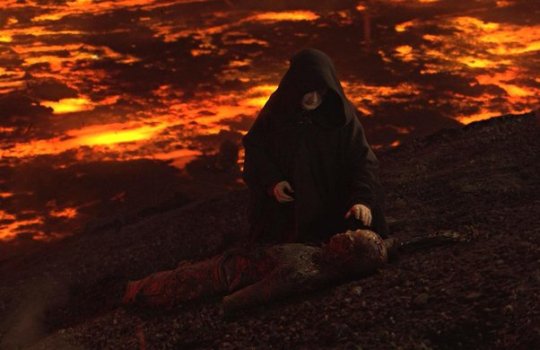
And the same reasons why Anakin justified Watto at first when he was a young kid also applied to Palpatine, he may be a sith but he ran the Republic better than those corrupt politicians, he isn´t a perfect Emperor but in Padme´s absence he is better than the alternatives. He isn´t as bad as a master and anyway I deserve this because I fell to the darkside and nobody can come back from that, if he abuses me I got this coming because I choose this and he still teaches me the ways of the force, he rescued me from Mustafar when Obi-Wan left me to die and he didn´t have to, he is all I have left.
So once Anakin´s voice died down Vader was left with many reasons to say to Palpatine "What´s your bidding my master?" because in his mind master isn´t a word that contradicts father and Palpatine became his father in all but name, this makes George´s words about Anakin fatal flaw being the fact he loved too much make complete sense and it´s a tragedy.
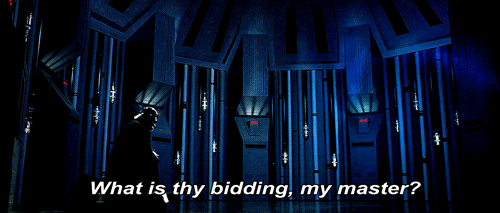
#anakin skywalker#darth vader#george lucas#shmi skywalker#palpatine#star wars#slavery/rape mention#anakin meta#The tragedy of Anakin Skywalker
156 notes
·
View notes
Text
personal star wars opinion vent
idk why people who like old republic star wars stuff like me are so defensive of the old jedi. they werent great. thats why i like them. its ok. “the jedi were actually right” well, i have consumed more than my doctor’s recommended share of star wars movies and books and tv shows and… um, i never had THAT take. what on earth?
like, even Star Trek knows their fantasy space government isnt perfect but the authors were trying to make their best example of a responsible society where people valued being moral above all else. the authors of Star Wars were explicitly trying to show where the old republic and jedi went wrong. they lived next door to sith lords for years and didn’t even notice, like, they weren’t even good at the one thing that was their “spec-ial-ity”. also, its totally cool to separate kids from their families even if the families would want them back? even if the kids are brought to war zones and expected to fight/work? YALL. what are you defending here.
I like the old republic and the old jedi order too, but like, NEITHER one was good and both explicitly had fallen morally to such a state that a sith lord literally took over and the galaxy suffered TREMENDOUSLY as a result of their incompetence. “Slavery is outlawed in the Republic” well dude, its being openly practiced on multiple planets. if only someone could do something about it. like the galactic wide government and their highly moral magical negotiation/military force? oh, they can’t? maybe theyre not that good at doing what they say they do. maybe they say a lot of nice things but when push comes to shove the jedi commit genocides and hide the evidence (murdering those tuskens was downright jedi-like, dont you know?). maybe questioning your government and not letting them get away with shit, even to the point of direct action and even violent rebellion, is a good thing. its almost like that was always the point.
#hollypunkerspost#rambling#‘no attachments is a good rule’ i mean it quite literally paved the way for Sidious to create Vader#but fuck me why would anyone watch the actual movies i guess#anakin was not born evil he was made and he did make himself but come the fuck on i dont think shmi skywalker woulda been a BAD influence#‘i cant join the dark side my mom said no’ *angry sidious noises*#star wars#this is the most ramble of rambly#vent#fantasy slavery#dont even get me started on the new movies i miss jacen and jaina
23 notes
·
View notes